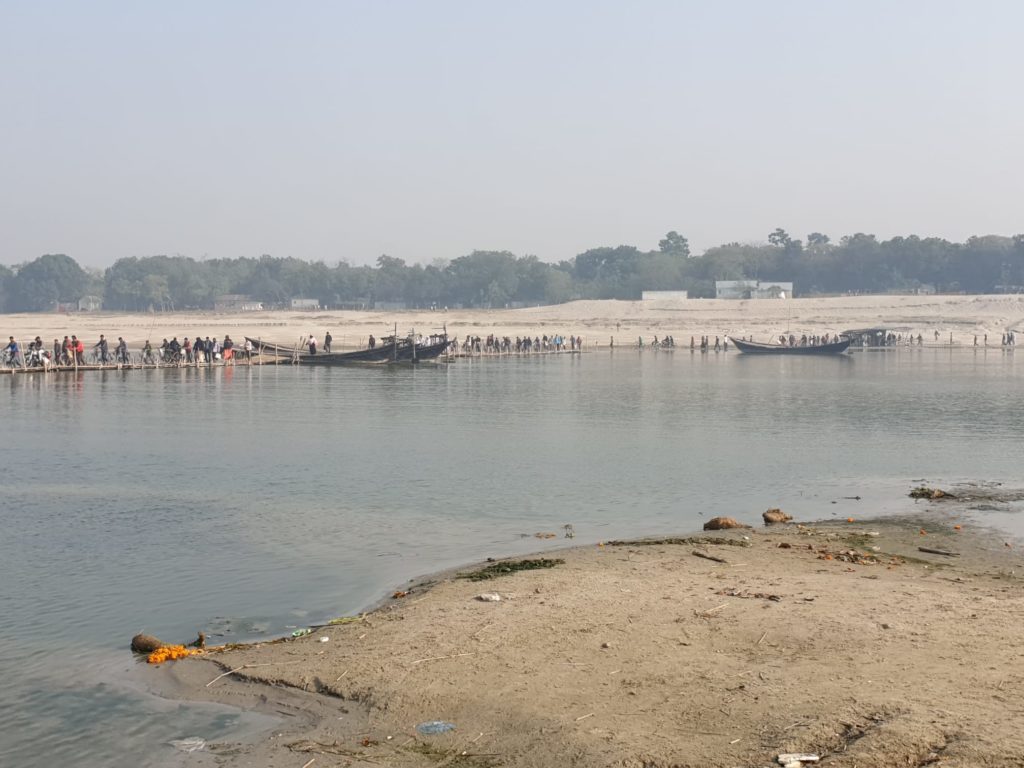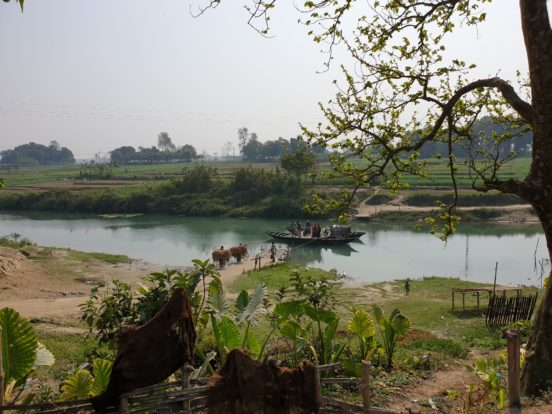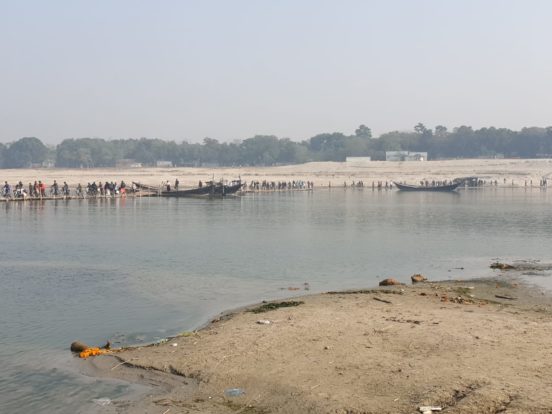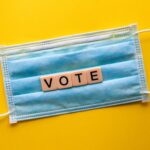Pseudonyms have been used for all people and places in order to protect the identity and anonymity of individuals
“Khulna’s Very Own Foreigner”
Four days turned my field site, and my place in it, upside down. It was early March 2020 and I had spent the previous four months establishing myself in Khulna, Bangladesh, to carry out ethnographic data collection for my PhD: untangling how human rights ideas intersect with women’s experiences of pregnancy and childbearing. I was lucky enough to have the support of friends and colleagues from icddr,b, an international public health research institution based in the capital of Dhaka, who had agreed to host me for my research in Khulna. I had a vibrant social work life: I shared an apartment with my roommate, Rosa, a young medical assistant who quickly became my ‘younger sister’, diligently correcting my Bangla and assisting me to navigate this unfamiliar location. I was taken in as family by the icddr,b field team, who invited me over regularly for dinners and painstakingly attempted to teach me to play cricket. I had built friendly relationships with the managers of the health facilities in the different sub-districts where I spent most of my days, who referred to me affectionately as ‘Khulna’s very own foreigner’. I did not hold any pretense that I was actually blending in by any stretch of the imagination. While bideshis, or foreigners, literally meaning from a place that is not part of the desh, or the homeland of Bangladesh, were certainly not unheard of around here, neither were we a common appearance. Unlike in Dhaka, people did not typically refrain from showing their intrigue with my presence. In some cases, women would ask politely to touch my pale arm or stroke my chestnut hair, which I typically accepted, or young men would ask to take a selfie with me, which I typically declined.
Like in most parts of the world, COVID 19 was on people’s minds in Bangladesh by the end of February. You could not travel far without overhearing a conversation including the word ‘coronavirus’. However, no cases had been reported in the country up until that point, so there was still a sense of security. Indeed, the government had a particular interest in keeping COVID 19 from surfacing in the country: They were preparing for Mujib Borsho, or the Year of Mujib, to commemorate the centenary of the birth of the iconic figure Sheikh Mujibir Rahman, the leader of the liberation movement and first president of Bangladesh. Sheikh Mujib, known as the Father of the Nation, and the literal father of the current Prime Minister, Sheikh Hasina, had taken power of a newly liberated Bangladesh in 1972, but was assassinated in a coup d’état in 1975. The countdown to the inaugural event of Mujib Borsho, set for his birthday on March 17th, had been launched on January 10th, marking the day that Sheikh Mujib had returned to an independent Bangladesh after being held in captivity in Pakistan during the liberation war. Now you could hardly turn your head without some reminder: countdown clocks erected at government buildings counting down the days, hours, minutes and seconds; stickers with the Mujib Borsho logo on government hospital doors; banners and signs with images of him and his family; a daily news segment dedicated to his legacy. The grand inauguration was to be held in Dhaka, attended by hundreds of thousands of participants, including a number of heads of state and special guests, notably Prime Minister Justin Trudeau of Canada and Prime Minister Narendra Modi of India.
“COVID WAS A DISEASE of the Bidesh“
Each morning, I watched on the news as the Director of the Institute of Epidemiology, Disease Control and Research (IEDCR) gave her perfunctory press briefing, each day wrapped in a different and elegant sari, assuring the country that there were no cases of COVID in Bangladesh. The main refrain was that COVID was a disease of the bidesh, foreign land, and that the country was taking efforts to ensure that people entering from abroad were screened, and if coming from certain places, quarantined for 14 days upon arrival. In tandem, I was hearing reports of a number of suspected cases and rumours that IECDR was refusing to test people. Each time the word bidesh was uttered in relationship to COVID, I could not help but take it just a little bit personally. One evening I found myself walking down the road with Azam, the field manager of icddr,b and one of my most trusted friends in Khulna. As we walked from the icddr,b office to my home, he informed me that icddr,b had instructed him to not shake hands with bideshis, indicating that he should keep his distance from me. I was taken a bit aback by his comment; I had been maintaining close communication with the Dhaka icddr,b team and there had certainly been no such official instruction.
This narrative of COVID’s association with the bidesh became simultaneously more pronounced as all the neighbouring countries of Bangladesh began reporting cases. As the discourse of social distancing became increasingly more entrenched throughout early March, the foreign dignitaries who had initially accepted the invitation to attend the Mujib Borsho inaugural event started to decline one by one. I began hearing more reports in Dhaka and in Khulna of suspected cases, but people seemed resigned to accept the open secret that nothing would, or could, be revealed officially until after the 17th of March. I travelled back to Dhaka to attend a national dissemination event scheduled for March 8, hosted by icddr,b. It was an emotional lead up to the event, hosting around 200 people, including national public health leaders. Even as attendees were arriving there was still heated debates of whether it should be maintained or cancelled. Without clear guidance from the government in a country that was supposedly free from COVID, this was a particularly difficult and politically fraught decision to take. In the end, the show went on.
After this event, I sat with the ten members of the icddr,b Dhaka team I was working most closely with at Gloria Jeans, a coffee shop located in one of the upscale areas of Dhaka. The mood was still light-hearted enough as we replayed the circus of events leading up to what finally turned out to be a successful event. And then the notification came. I am not sure who saw it first, but IECDR had announced that three people had tested positive for COVID in Bangladesh. Consistent with the narrative, two were men who had recently returned from Italy and the third was one of their family members. This news came as a jolt and immediately transformed our moods to something more sombre.

“Khulna no longer felt like home”
I returned to a transformed Khulna four days after I had left, admittedly unprepared for what I was to find. The announcement of the COVID cases had transformed Khulna into a place I no longer recognized. People on the streets were wearing masks now. I could feel people’s eyes fix on me and then readjust their masks over their mouth and nose while moving away to avoid me. The drivers of the CNGs, the small green three-wheeled vehicles that we took to move from village to village, were wearing masks. But it was not until I reached my destination, a small village about 45 minutes from the city of Khulna, that I realized just how deeply this ran. I had travelled there to visit a satellite clinic being run by a private hospital. In this temporary clinic, a paramedic was providing basic health consultations to women and children in an empty room.
Like usual, there was an interest in my presence and the women gathered around me to ask the typical questions: Where was I from? Was I married? Did I have children? But it was only moments before the topics turned from the banal to deeper concerns: Did I have coronavirus? They had heard that the government was not letting bideshis in anymore. How did I get into the country? It was then that it sunk in. Even these women here, in such a remote place, had gotten the message: there was an infection ‘coronavirus’ which was a risk to them, and this was a risk from the bidesh, embodied by bideshis. And now I, quite possibly the only bideshi that they had interacted with, embodied this infection and I was seen as a risk of contamination.
It was impossible not to notice the reactions that my presence provoked in the days that followed. Some responses felt more vicious than others. People who wanted to catch a glimpse of a bideshi would still approach me, but now women would cover their mouths and noses with a headscarf before getting close and would quickly retreat when I approached. In the market, men would shout out comments in my direction about coronavirus. 11-year-old boys wearing face masks would pretend to chase after me. Other responses felt more legitimately concerned, and some seemed intended to be supportive. For example, the deputy manager of the district hospital had assured Azam that I would be exempt from going before the board that they had established to examine any person coming from abroad to determine whether they were a risk to the district. “Don’t worry, Azam,” he had assured him. “Janet is your family. She will not have to face the board.” However, what struck me was that creating this board specifically for people coming from abroad, of which there were notably few here, had become the priority of this crisis in Khulna, amidst the many which could have been chosen, with health facilities underprepared for providing basic services.
I found myself ruminating over my security in ways I had not before. Was it even safe for me to visit the more remote areas? And if I chose to go, should I (God forbid) take a man with me to be more secure? Was it even ethical for me to go to health facilities where the patients would most likely associate me with COVID? Somehow, the fact that I was spending time with pregnant women made these ethical questions feel more weighted. Khulna no longer felt like home.
When I woke up to the news that the World Health Organization had declared COVID 19 a pandemic, I did not know that it would be my last morning waking up in Khulna. I visited a sub-district hospital close to home that day. When I arrived, the health manager was standing out in the front of the building. He invited me into his office, and like usual I took the seat in front of his desk. The concern was visible in his face. A few patients passed in and out to consult him. In between, we chatted and sipped on the sugary black tea with fresh ginger he had asked his staff to serve us. He sighed heavily as he told me of his worries of what he now felt to be the inescapable approach of coronavirus. His hospital was already at capacity; what were they going to do when COVID patients started to come as well? He asked me whether I had brought hand sanitizer. I proudly held up my small bottle of the clear Purell liquid, which was finally going to use after six months in the country. The substance had already become scarce here, as it had elsewhere. He showed me his bottle of blue sanitizer in turn. “I had to bring this from home,” he told me, explaining that he did not have sanitizer or masks to protect himself or his health service providers. His anxiety was palpable. Inevitably, people passing through the office would make comments in my direction about coronavirus and the manager would assure them that I had been in Bangladesh for a long time and was not infectious.
“COVID has allowed us to watch xenophobia produced in real time”
After that day, as flight routes started shutting down one by one, I knew that I had to return to my family in Europe before I no longer could. My last evening in Bangladesh was spent, once again, with the icddr,b team in the same Gloria Jeans where we had learned of the first COVID cases in Bangladesh. Sitting with some of my closest friends, we laughed and joked over coffee and greasy potato wedges. They teased me when I insisted that they accept my dab of hand sanitizer between touching their phones and grabbing a potato wedge. For some of them, my decision to go back to Switzerland did not make much sense. Of course they understood that I should be with my family during this turbulent period, but why go back to the epicentre of the pandemic when I could ride it out in the comparatively better off Bangladesh?
I landed in Europe two days before what little of the Mujib Borsho inauguration ceremony was able to go on. There were still fireworks, but no crowds to admire them. As expected, things changed immediately after March 17th. Testing increased (though not sufficiently), cases started being confirmed on a daily basis, and people were officially dying as a result of COVID 19. Although schools were closed in the country as of March 18th, the government declared a national ‘holiday’ as of March 26th that keeps getting extended. A holiday sounds nicer than an emergency or a lockdown but is supposed to communicate the same idea. Everyone is scrambling to make sense of this situation, not only in terms of health, but in terms of the economic situation in a context in which a social safety net is something of a pipe dream. Watching from afar, I wish that we could go back to the frivolity of my last evening in Gloria Jeans, when someone could still throw out a far-fetched theory of the climate of Bangladesh being protective against COVID, or that Bangladeshis’ natural immunity will serve to fend it off—Europeans obviously have the weaker immune systems as they get annual flu shots and are not exposed to as many pathogens. These theories felt more hopeful than naïve, as none of us wanted to imagine the alternative. Now I can only watch from afar and hope that the worst-case scenarios do not materialize.
COVID 19 has not created xenophobia and it is unfortunately too much a part of what many people have to navigate in their everyday even under (more) normal circumstances. However, what COVID has allowed is for us to watch the insidious and swift ways in which xenophobia and racism are produced in real time. It is often heard that COVID 19 is an ‘invisible enemy’. While it may be true that the material virus is too small for the human eye to perceive, through politicizing it and associating it with particular bodies, we render the virus visible. Though manifesting differently, these xenophobic responses have been ubiquitous. At their most innocuous, they lead to a waste of valuable energy and resources that could be better directed towards working toward solutions that address this crisis shared by humanity. At their worst they have led to many people feeling less safe in this already destabilized world and to violence. It is my hope that when the dust has settled, we are able to use this experience to better understand how xenophobia is produced both politically and otherwise in order to work towards a world where there is less of it.
Janet Perkins is a PhD candidate in Social Anthropology at the University of Edinburgh School of Social and Political Science. Her research focuses on human rights, women’s health and international development, building on extensive professional experience in global health and international development.











Comments by Ritti Soncco